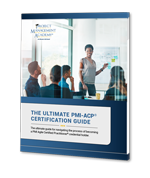Professional certifications validating your skills are an advantage in a hyper-competitive job market. For project managers newer to the field with three or fewer years of experience, the Project Management Institute (PMI)®’s recommends the CAPM® and PMI ACP® certifications to support career growth. Each certification brings benefits, so it is important to understand the differences to best align with your professional goals.
On this page:
- Value of industry certifications for early-career project management professionals
- Understanding early career credential options: CAPM vs PMI-ACP
- Certified Associate in Project Management (CAPM)® Overview
- Project Management Institute Agile Certified Practitioner® (PMI-ACP) Overview
- CAPM vs. PMI-ACP | Similarities and Differences
- CAPM vs PMI ACP: Which Certification is Right for You?

Download the Ultimate Guide to learning about the PMI-ACP Certification.
Value of industry certifications for early-career project management professionals
You may be doing project management as part of your job or even your primary function, but your experience will only carry you so far. Completing the training needed to earn a certification in project methodologies has excellent value, including:
- demonstrating your commitment to project management global standards,
- validating your project management knowledge, and
- signaling your desire to advance as a project manager.
If you are early in your project management career, likely mentors or senior project managers have shared that your experience now will help you qualify down the road for the Project Management Institute’s renowned Project Management Professional (PMP)® certification. And that is very much the case and a great professional goal. However, you need not wait years to add a project management credential to your resume to enhance your career prospects. That’s where the PMI’s Certification Framework helps you identify which credential aligns with your current project management experience and goals.
Understanding early career credential options: CAPM vs PMI-ACP
PMI offers many certifications that reflect the breadth of project management methodologies. With training, education, and experience requirements, each PMI certification serves a specific purpose – whether to signal your Agile experience and knowledge or to verify your ability to leverage different methodologies depending on the business need.
PMI’s Certification Framework begins with the “new to projects” category for those new to projects (3 or fewer years of job experience). It includes Certified Associate in Project Management (CAPM)® and PMI Agile Certified Practitioner (PMI-ACP)®.

Certified Associate in Project Management (CAPM)® Overview
CAPM is for those new to project management. It covers a broad range of Project Management methodologies and can potentially “open more doors” for assignments to projects and career options.
Certification Purpose
CAPM certification requirements provide a foundation for additional PMI certifications, like PMP®, with contact hours carrying forward and shared exam content from PMI’s “Guide to the Project Management Body of Knowledge (PMBOK® Guide). Gaining the CAPM credential signals to current and prospective employers that you are committed to the profession.
Certification Exam Concepts
PMI states that the CAPM® certification exam assesses your “fundamental knowledge, processes, and terminology as defined in [PMBOK® Guide and] needed for effective project management performance.”
Certification Eligibility Requirements
CAPM is ideal for high school graduates looking to shape their career moves. With no experience requirements, CAPM can be the foundation of your project management certification journey.
- Education Requirements
- High school diploma
- 23 contact hours
- Experience Requirements
- None
Certification Exam Format
The CAPM certification exam includes 150 questions within a 3-hour time limit.
Certification Badge
Earning PMI certifications comes with digital badging, which you can include on your resume, LinkedIn profile, and professional brand assets. The PMI CAPM® digital certification badge is:

Project Management Institute Agile Certified Practitioner® (PMI-ACP) Overview
Project management is a dynamic field with multiple methodologies for different business needs. Agile continues to grow in adoption across industries. With PMI-ACP, early career professionals demonstrate knowledge and experience applying agile methodologies.
Certification Purpose
PMI designed the PMI-ACP to formally recognize an early career professional’s “real-world, hands-on experience and skill as part of an agile team.” It is foundational to other PMI certifications for project management, including but not limited to PMP and other Agile certifications.
Certification Exam Concepts
PMI states that the PMI-ACP exam content “spans many approaches to agile such as Scrum, Kanban, Lean, extreme programming (XP), and test-driven development (TDD), not limiting a practitioner to one agile approach.”
Certification Eligibility Requirements
PMI-ACP, like CAPM, is ideal for those who have completed high school and are looking to shape the next steps in their career. It is focused on Agile project methods, and the requirements reflect the needed education and experience for success.
Education Requirements
- Secondary Education: High school diploma, GED, or global equivalent
- Formal Training: 28 contact hours of training in agile practices, frameworks, or methodologies
Experience Requirements:
You must meet ONE of the following three options:
- Option A: 2 years of agile project experience in the past 5 years working on agile project teams or with agile methodologies
- Option B: 1 year of agile experience AND an active 3rd party agile certification (certification must be current and earned more than 1 year ago)
- Option C: 1 year of agile experience AND a degree from a Global Accreditation Center (GAC) program
Certification Exam Format
The PMI-ACP Exam has 120 total questions (100 scored and 20 unscored questions) with a 3-hour time limit. Questions are broken down into 4 domains:
- Mindset (28%)
- Leadership (25%)
- Product (19%)
- Delivery (28%).
Certification Badge
Earning PMI certifications comes with digital badging, which you can include on your resume, LinkedIn profile, and professional brand assets. The PMI-ACP® digital certification badge is:

CAPM vs. PMI-ACP | Similarities and Differences
Pursuing PMI certification at any career junction requires planning, studying, and using PMI-authorized training to ensure success.
CAPM and PMI-ACP Similarities
CAPM and PMI-ACP share not only administration by PMI but similar certification exam best practices, including a study plan supported by PMI-verified training. Similarities include:
- Managed by the global organization Project Management Institute (PMI)®.
- Enhance project management standards and skills in support of career development.
- Exam preparation is recommended.
- Designed for an early-career professional.
CAPM and PMI-ACP Differences
The CAPM covers the entirety of project management methodologies, including Agile. In contrast, PMI-ACP is specific to Agile. Differences include:
- Scope and intent
- Eligibility requirements
- Exam level of difficulty
- Demand levels in types of industries
- Certification maintenance and renewal requirements
Entrepreneur magazine recently ranked CAPM® as # 1 for the Most In-Demand Professional Certifications. The ranking reflects the generalized nature of the certification as opposed to the PMI-ACP® singular focus on Agile.
CAPM vs PMI ACP: Which Certification is Right for You?
As an early career project manager, when weighing which project management certification to pursue next and knowing that earning one does not preclude you from gaining the other, use these factors to inform your choice:
| Factors | CAPM® | PMI-ACP® |
|---|---|---|
| Career goals and interests | Project management generalist | Agile specialist focus |
| Industry demand and job market trends | #1 ranking by Entrepreneur magazine for most in-demand certifications | Growing demand in Agile environments across industries |
| Experience and background requirements | No experience required | 2 years agile experience OR 1 year agile experience plus additional qualifications |
| Education requirements | High school diploma + 23 contact hours | High school diploma + 28 contact hours in agile practices |
| Maintenance and renewal | 3-year certification cycle with PMI renewal fees and PDU requirements | 3-year certification cycle with 30 PDUs required for renewal |
Project Managers often ask these questions as part of their process to select certifications to earn.
What are the typical challenges faced by exam candidates?
The most common challenge is people answering questions based on their experience or what is “right” with their organization instead of what the PMBOK/Agile Practice Guide recommends.
How have project management trends, such as the growing adoption of Agile methodologies, influenced the demand CAPM and PMI-ACP certifications in the job market?
As the CAPM includes Agile practices, the move towards agile approaches has not significantly diminished demand for the CAPM.
Are there any specific scenarios where one certification would be more beneficial to the project manager than the other?
If you are new to Project Management, start with the CAPM®. If your company uses Agile, you work in software, or you want to become an Agile specialist, choose the PMI-ACP®.
Conclusion
Align your project management certification choice with your professional goals, the types of projects you like to manage, and industry trends. Remember:
- Training is needed to meet educational requirements and support your goals to become certified.
- CAPM is a foundation for future project management certifications.
- PMI-ACP certification is for professionals with substantial agile project experience (minimum 2 years) seeking to work in Agile methodologies.
- PMI manages both, and there are exam requirements and PMI renewal fees for all.
Certifications demonstrate your knowledge of best practices and your committee to the profession of project management.


 New Horizons
New Horizons
 Project Management Academy
Project Management Academy
 Six Sigma Online
Six Sigma Online
 TCM Security
TCM Security
 TRACOM
TRACOM
 Velopi
Velopi
 Watermark Learning
Watermark Learning
 Login
Login




 New Horizons
New Horizons
 Project Management Academy
Project Management Academy
 Velopi
Velopi
 Six Sigma Online
Six Sigma Online
 TCM Security
TCM Security
 TRACOM
TRACOM
 Watermark Learning
Watermark Learning